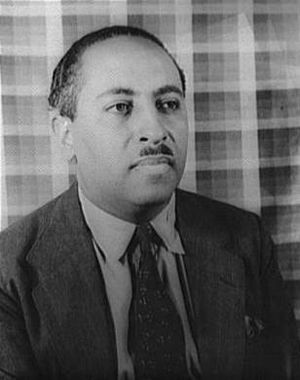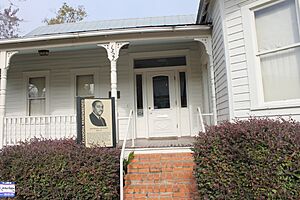Arna Bontemps facts for kids
Quick facts for kids
Arna Bontemps
|
|
|---|---|

Bontemps photographed by Carl Van Vechten, 1938
|
|
| Born | Arna Wendell Bontemps October 13, 1902 Alexandria, Louisiana, U.S. |
| Died | June 4, 1973 (aged 71) Nashville, Tennessee, U.S. |
| Occupation | Poet, novelist and librarian |
| Education | Pacific Union College |
| Period | 1924–1973 |
Arna Wendell Bontemps ( BON-tom) (October 13, 1902 – June 4, 1973) was an American poet, novelist, and librarian. He was an important part of the Harlem Renaissance, a time when African-American art, music, and literature flourished in the 1920s.
Contents
Early Life and Education
Arna Bontemps was born in Alexandria, Louisiana. His family had a mixed background, including both free people of color and French settlers. His father worked as a builder, and his mother was a schoolteacher.
When Arna was three, his family moved to Los Angeles, California. This was part of the Great Migration, when many African Americans moved from the Southern United States to cities in the North, Midwest, and West. They settled in the Watts area of Los Angeles.
After finishing public school, Bontemps went to Pacific Union College in California. He graduated in 1923 with a major in English and a minor in history. He was also a member of the Omega Psi Phi fraternity.
Becoming a Writer
After college, Bontemps met author Wallace Thurman in Los Angeles. Soon after, Bontemps moved to New York City and became a key figure in the Harlem Renaissance.
In August 1924, when he was 22, Bontemps published his first poem, "Hope," in The Crisis magazine. This magazine was published by the National Association for the Advancement of Colored People (NAACP). The poem showed his feelings of uncertainty about his future career.
Bontemps started teaching at the Harlem Academy in New York City in 1924. While teaching, he kept writing and publishing poetry. He won the Alexander Pushkin Prize from Opportunity magazine in both 1926 and 1927. He also won the Crisis Poetry Prize in 1926.
In New York, Bontemps became friends with many other famous writers. These included Countee Cullen, Langston Hughes, W. E. B. Du Bois, Zora Neale Hurston, James Weldon Johnson, Claude McKay, and Jean Toomer. Langston Hughes became a very close friend and often worked with Bontemps.
In 1926, Bontemps married Alberta Johnson. They had six children together: Joan, Paul, Poppy, Camille, Connie, and Alex.
Moving and Writing More
In 1931, during the Great Depression, Bontemps left New York and his teaching job. He and his family moved to Huntsville, Alabama, where he taught at Oakwood Junior College for three years.
In the early 1930s, Bontemps started writing fiction, not just poetry. His first novel, God Sends Sunday (1931), received a lot of attention. It was about an African-American jockey named Little Augie who easily made and spent money. Critics liked Bontemps' writing style and how he created his characters. However, W. E. B. Du Bois thought the book was a bit too harsh. Later, Bontemps worked with Countee Cullen to turn the novel into a play called St. Louis Woman (1946).
Bontemps also began writing books for children. In 1932, he worked with Langston Hughes on Popo and Fifina. This book introduced children to life in Haiti through the story of two siblings. He continued with children's books like You Can't Pet a Possum (1934), about a boy and his pet dog in rural Alabama.
While in Alabama, there were some difficult events happening nearby. The school where Bontemps taught became concerned about his visitors and his ideas. Bontemps refused to burn his books, so he left his teaching job. In 1934, he and his family moved back to California.
In 1936, Bontemps published Black Thunder, which many consider one of his best works. This novel tells the story of a slave rebellion that happened in 1800 near Richmond, Virginia. It was led by Gabriel Prosser, a field worker who planned to gather a slave army. The rebellion was stopped when a fellow slave betrayed Prosser, who was then captured. The book received great reviews, but Bontemps didn't earn enough money from its sales to support his family.
He briefly taught in Chicago before joining the WPA Illinois Writers' Project. In 1938, after his children's book Sad-Faced Boy (1937), Bontemps received a special grant to work on his novel Drums at Dusk (1939). This book was about Toussaint Louverture's slave rebellion in Haiti.
Bontemps found it hard to make a living from his writing and felt discouraged. He decided to focus his serious writing on younger readers. He met Jack Conroy on the WPA project, and they wrote The Fast Sooner Hound (1942), a children's story about a very fast dog.
Librarian and Later Works
In 1943, Bontemps went back to school and earned a master's degree in library science from the University of Chicago. He then became the head librarian at Fisk University in Nashville, Tennessee. There, he helped build important collections of African-American literature and culture, including the Langston Hughes Renaissance Collection. He worked at Fisk until 1964 and returned occasionally.
After retiring from Fisk University in 1966, Bontemps worked at the University of Illinois at Chicago and later at Yale University. At Yale, he was in charge of the James Weldon Johnson Collection.
During these years, Bontemps published many books for different ages. He wrote children's books like Slappy Hooper (1946) and Sam Patch (1951) with Jack Conroy. He also wrote Lonesome Boy (1955) and Mr. Kelso’s Lion (1970). For teenagers, he wrote biographies about important figures like George Washington Carver, Frederick Douglass, and Booker T. Washington.
His book Story of the Negro (1948) was highly praised and received the Jane Addams Children's Book Award. It was also recognized as a Newbery Honor Book.
Bontemps continued to work with Langston Hughes on books for adults. They co-edited The Poetry of the Negro (1949) and The Book of Negro Folklore (1958). With Jack Conroy, he wrote They Seek a City (1945), a history of African-American migration in the U.S., later updated as Anyplace But Here (1966). He also wrote 100 Years of Negro Freedom (1961) and edited other important collections.
Arna Bontemps passed away on June 4, 1973, at his home in Nashville, Tennessee, at the age of 71. He was working on a collection of short stories called The Old South (1973) at the time. He is buried at Greenwood Cemetery in Nashville.
Through his work as a librarian and writer, Arna Bontemps played a huge role in making African-American literature recognized and preserved. His many contributions as a poet, novelist, children's writer, editor, librarian, and historian greatly influenced modern African-American literature and culture.
Legacy and Honors

- During his life, Bontemps received two Guggenheim Fellowships, which are special awards for people in the arts and sciences.
- In 2002, scholar Molefi Kete Asante included Arna Bontemps in his list of the 100 Greatest African Americans.
Works
- God Sends Sunday: A Novel (1931)
- Popo and Fifina, Children of Haiti, with Langston Hughes (1932)
- You Can’t Pet a Possum (1934)
- Black Thunder: Gabriel's Revolt: Virginia 1800 (1936)
- Sad-Faced Boy (1937)
- Drums at Dusk: A Novel (1939)
- Golden Slippers: an Anthology of Negro Poetry for Young Readers, compiled by Arna Bontemps (1941)
- The Fast Sooner Hound, with Jack Conroy (1942)
- They Seek a City (1945)
- We Have Tomorrow (1945)
- Slappy Hooper, the Wonderful Sign Painter, with Jack Conroy (1946)
- Story of the Negro (1948)
- The Poetry of the Negro, 1746–1949: an anthology, edited with Langston Hughes (1949)
- George Washington Carver (1950)
- Father of the Blues: an Autobiography, W. C. Handy, edited by Arna Bontemps (1941, 1957)
- Chariot in the Sky: a Story of the Jubilee Singers (1951)
- Lonesome Boy (1955)
- Famous Negro Athletes (1964)
- Great Slave Narratives (1969)
- Hold Fast to Dreams: Poems Old and New Selected by Arna Bontemps (1969)
- Mr. Kelso’s Lion (1970)
- Free at Last: the Life of Frederick Douglass (1971)
- The Harlem Renaissance Remembered: Essays, Edited, With a Memoir (1972)
- Young Booker: Booker T. Washington’s Early Days (1972)
- The Old South: "A Summer Tragedy" and Other Stories of the Thirties (1973)
Recorded Works
- In the Beginning: Bible Stories for Children by Sholem Asch (Folkways Records, 1955)
- Joseph and His Brothers: From In the Beginning by Sholem Asch (Folkways Records, 1955)
- Anthology of Negro Poets in the U.S.A. - 200 Years (Folkways Records, 1955)
- An Anthology of African American Poetry for Young People (Folkways Records, 1990)
See Also
- Kirkland C. Jones, Renaissance Man from Louisiana: A Biography of Arna Wendell Bontemps (Westport: Greenwood Press, 1992).
- Charles Harold Nichols, editor, Arna Bontemps-Langston Hughes Letters, 1925–1967 (New York: Dodd, Mead, 1980).
- James Weldon Johnson Collection in the Yale Collection of American Literature, Beinecke Rare Book and Manuscript Library.
 | Victor J. Glover |
 | Yvonne Cagle |
 | Jeanette Epps |
 | Bernard A. Harris Jr. |

